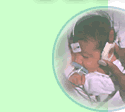

 |
House Appropriations Committee Asked to Increase Funding for Newborn Hearing Screening and Balance Clinical Research
(ROCKVILLE, MD, March 8, 2000) In testimony presented today to the Appropriations Subcommittee on Labor, Health and Human Services, Education and Related Agencies in the U.S. House of Representatives, the American Speech-Language-Hearing Association (ASHA) asked that funding for the Newborn Hearing Screening and Intervention Act be funded at its fully authorized level of $15 million for FY2001.
ASHA President Jeri Logemann, PhD, CCC-SLP, who presented the testimony, praised Chairman John Porter (R-IL) and the members of the committee for their leadership on the newborn hearing screening legislation.
"Through the subcommittee's efforts and a surge of new state laws to expand coverage for early hearing screening and intervention services, our country is on the path to eradicating delayed detection for hearing loss within the next five years," said Logemann.
The new law, which was supported by more than twenty national audiological, medical and related consumer organizations, enables up to three years of federal funding for state grants to develop infant hearing screening and intervention programs through the Health Resources and Services Administration (HRSA) and the Centers for Disease Control (CDC). Specifically, the law directs HRSA, CDC, and the National Institute on Deafness and other Communication Disorders (NIDCD) to work together to develop and expand statewide screening programs, link screening programs with community-based intervention efforts, monitor the impact of early detection and intervention activities, and provide technical assistance on data management and applied research.
Funding level for the state grants through HRSA and CDC is $7 million for FY2000. "We have learned that more than 40 applications from States have been received for the HRSA grants alone," said Logemann. "Only about half of these applications will be awarded under the current funding level. The CDC is also expected to receive more grants than they can fund.
"If the number of states passing newborn hearing screening legislation continues to increase and we can fund the Walsh provision at its fully authorized level of $15 million next year, we can give infants with hearing loss the opportunity to develop on par with their hearing peers by school age," Logemann stated.
Logemann also commended committee members for their efforts in securing a 15 percent increase in funding for the National Institutes of Health (NIH).
"ASHA supports the Subcommittee's commitment to double NIH's budget by 2003," said Logemann, "and we are particularly supportive of efforts to increase the investment of research across all institutes involved with communication sciences and disorders."
Since its authorization in 1988, NIDCD has been the focal point for conducting research to improve the understanding of the normal mechanism and disorders associated with hearing, voice, speech, language, and balance.
"The public's growing demand for evidence-based treatment options strengthens our conviction that more multi-centered, patient-oriented clinical research must be supported," Logemann stated, "and we are deeply concerned about the decline in funding for this type of research versus basis research at NIDCD, especially with respect to multi-center clinical trials."
Multi-center, patient-oriented clinical research represents a crucial phase in the conversion of basic research findings into effective prevention strategies, diagnostic procedures, and treatment methods resulting in improved communication for individuals.
In her testimony, Logemann outlined recommendations to enhance programs in the areas of research and research training in hearing, voice, speech, language, and balance. The recommendations are to 1) Increase support for studies addressing the identification of hearing loss in newborns, infants, and children; 2) Increase support of mechanisms that enhance the training of clinical researchers; 3) Increase support of interdisciplinary research; and 4) Examine the extramural grant portfolio at NIDCD to ensure that it demonstrates a balance of basic and clinical research.
ASHA is the national professional, scientific, and credentialing association for more than 97,000 audiologists, speech-language pathologists, and speech, language, and hearing scientists. Audiologists are hearing health care professionals who specialize in preventing, identifying, and assessing hearing disorders as well as providing audiologic treatment including hearing aids. Speech-language pathologists are health care professionals who identify, assess, and treat speech and language problems including swallowing disorders.
Back
to Early Hearing Detection & Intervention Action Center
Press
Conference at U.S. Capitol
Issue
Brief: Early
Hearing Detection & Intervention
Facts on
Hearing Loss in Children
Frequently
Asked Questions

